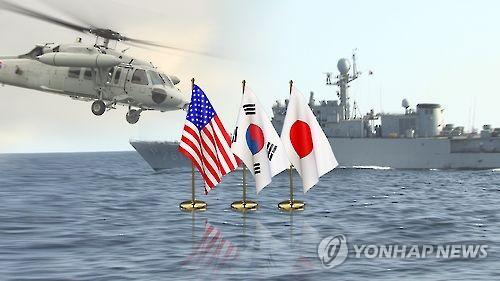- California Assembly OKs highest minimum wage in nation
- S. Korea unveils first graphic cigarette warnings
- US joins with South Korea, Japan in bid to deter North Korea
- LPGA golfer Chun In-gee finally back in action
- S. Korea won’t be top seed in final World Cup qualification round
- US men’s soccer misses 2nd straight Olympics
- US back on track in qualifying with 4-0 win over Guatemala
- High-intensity workout injuries spawn cottage industry
- CDC expands range of Zika mosquitoes into parts of Northeast
- Who knew? ‘The Walking Dead’ is helping families connect
U.S., S. Korea, Japan conduct first joint missile-tracking exercise
WASHINGTON, June 28 (Yonhap) — The United States, South Korea and Japan conducted their first joint missile-tracking exercise off Hawaii on Tuesday in an effort to better defend against threats from North Korea, officials said.
The “Pacific Dragon” exercise came as the North has been carrying out a series of test-firings of the Musudan intermediate-range ballistic missile. Last week, Pyongyang claimed success in its sixth test of the missile believed to be capable of reaching the U.S. territory of Guam.
It was the first anti-missile drills between the three countries.
“Pacific Dragon not only allows participants the opportunity to exercise ballistic missile defense but it enhances the already strong relationship of all three nations participating,” said Vice Adm. Nora Tyson, commander of U.S. 3rd Fleet, in a statement.
The exercise featured a coordinated live ballistic target tracking event where each nation’s Aegis Ballistic Missile Defense System capabilities were tested and improved, the statement said. All participants shared tactical data link information in accordance with a trilateral information sharing agreement, it said.
Though no missiles were fired during the exercise, “all participants strengthened interoperability, communication channels, data collection, and capabilities assessments,” the statement said.
“This trilateral exercise strengthens relationships with participating allies and partners while further developing maritime regional BMD capability and capacity,” it said. “The ability to work together at sea, especially on aspects such as BMD, humanitarian relief as well as search and rescue operations, benefits the shared security interests of all three nations.”
North Korea reacted angrily to the exercise, vowing to further bolster its nuclear arsenal.
“The drill staged in the Pacific Ocean was another military provocation against the DPRK and a revelation of their hegemonic scenario for disturbing regional peace and security,” said a spokesman for the Disarmament and Peace Institute of the North’s Foreign Ministry, according to the Korean Central News Agency.
“Now that the U.S. and other hostile forces are posing constant threat to the security of the DPRK and the region by frequently staging joint military exercises, the army and people of the DPRK will bolster in a sustainable manner the capabilities for preemptive nuclear attack to pose a constant threat to the enemies, and put spurs to research and development of diverse strategic attack weapons,” the spokesman said.












